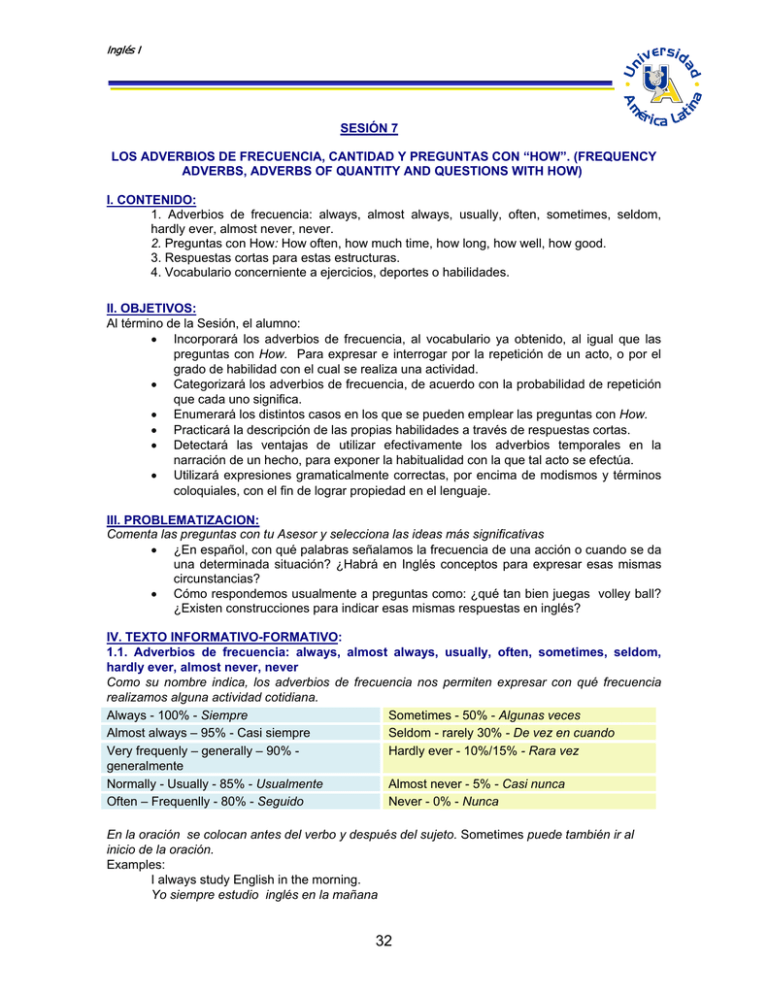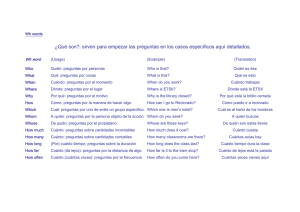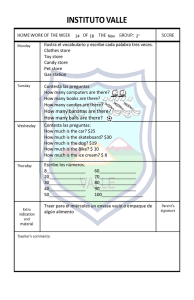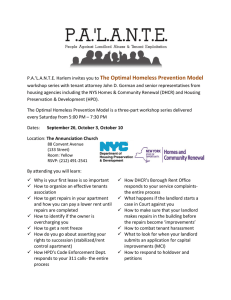sesión 7 los adverbios de frecuencia, cantidad y preguntas con
Anuncio

Inglés I SESIÓN 7 LOS ADVERBIOS DE FRECUENCIA, CANTIDAD Y PREGUNTAS CON “HOW”. (FREQUENCY ADVERBS, ADVERBS OF QUANTITY AND QUESTIONS WITH HOW) I. CONTENIDO: 1. Adverbios de frecuencia: always, almost always, usually, often, sometimes, seldom, hardly ever, almost never, never. 2. Preguntas con How: How often, how much time, how long, how well, how good. 3. Respuestas cortas para estas estructuras. 4. Vocabulario concerniente a ejercicios, deportes o habilidades. II. OBJETIVOS: Al término de la Sesión, el alumno: • Incorporará los adverbios de frecuencia, al vocabulario ya obtenido, al igual que las preguntas con How. Para expresar e interrogar por la repetición de un acto, o por el grado de habilidad con el cual se realiza una actividad. • Categorizará los adverbios de frecuencia, de acuerdo con la probabilidad de repetición que cada uno significa. • Enumerará los distintos casos en los que se pueden emplear las preguntas con How. • Practicará la descripción de las propias habilidades a través de respuestas cortas. • Detectará las ventajas de utilizar efectivamente los adverbios temporales en la narración de un hecho, para exponer la habitualidad con la que tal acto se efectúa. • Utilizará expresiones gramaticalmente correctas, por encima de modismos y términos coloquiales, con el fin de lograr propiedad en el lenguaje. III. PROBLEMATIZACION: Comenta las preguntas con tu Asesor y selecciona las ideas más significativas • ¿En español, con qué palabras señalamos la frecuencia de una acción o cuando se da una determinada situación? ¿Habrá en Inglés conceptos para expresar esas mismas circunstancias? • Cómo respondemos usualmente a preguntas como: ¿qué tan bien juegas volley ball? ¿Existen construcciones para indicar esas mismas respuestas en inglés? IV. TEXTO INFORMATIVO-FORMATIVO: 1.1. Adverbios de frecuencia: always, almost always, usually, often, sometimes, seldom, hardly ever, almost never, never Como su nombre indica, los adverbios de frecuencia nos permiten expresar con qué frecuencia realizamos alguna actividad cotidiana. Always - 100% - Siempre Sometimes - 50% - Algunas veces Almost always – 95% - Casi siempre Seldom - rarely 30% - De vez en cuando Very frequenly – generally – 90% Hardly ever - 10%/15% - Rara vez generalmente Normally - Usually - 85% - Usualmente Almost never - 5% - Casi nunca Often – Frequenlly - 80% - Seguido Never - 0% - Nunca En la oración se colocan antes del verbo y después del sujeto. Sometimes puede también ir al inicio de la oración. Examples: I always study English in the morning. Yo siempre estudio inglés en la mañana 32 Inglés I Marko usually practices basketball with his friends. Marko usualmente practica basketball con sus amigos The teachers often eat lunch with us at the cafeteria. Los maestros seguido comen con nosotros en la cafetería My mother sometimes makes chocolate muffins for me/Sometimes my mother makes chocolate muffins for me. Algunas veces mi mamá me prepara muffins de chocolate. Larry and Gary seldom visit their family. De vez en cuando, Larry y Gary visitan a su familia We hardly ever go camping. Rara vez, nosotros vamos de campamento The Henderson family almost never goes on vacation. Casi nunca, la familia Henderson va de vacaciones Alice never takes a shower on Sundays. Alicia nunca se baña los domingos Se usa ever en preguntas cuando buscamos obtener respuestas de frecuencia. Ejemplos: Are you ever late for school? – Yes, sometimes I arrive late. Do you ever drive to scholl? – No, I never drive to school / yes, I often do. Así mismo cuando se utiliza how often para preguntar se obtienen respuestas de frecuencia. Ejemplos: How often does Karen go to the gym? – She goes every day. How often do you go to the movies? – I usually go every other week. 2.1. Preguntas con How: how often, how much time, how long, how well, how good La pregunta How often sirve para preguntar la frecuencia de alguna actividad: How often do you exercise? – ¿Qué tan seguido haces ejercicio? How often does Sandra do liftweigths? – ¿Qué tan seguido Sandra hace pesas? How often do Andrea and Paco ride their bicycles? ¿Qué tan seguido Andrea y Paco pasean en sus bicicletas? La pregunta how much time nos permite preguntar acerca de la frecuencia relativa al tiempo con que realizamos alguna actividad (in American English How long is more frequently used used instead of How much time): How much time does Sally spend in the gym?/ How long does Sally stay in the gym? - ¿Cuánto tiempo pasa Sally en el gimnasio? How much time do Luis and you practice tennis? /How long do Luis and you practice tennis? - ¿Cuánto tiempo practican tennis Luis y tú? How much time does Mario play soccer? / How long does Mario play soccer? - ¿Cuánto tiempo juega soccer Mario? La pregunta how long permite preguntar sobre distancia: How long does Azafa Powel run every day? - ¿Qué tan lejos corre Azafa Powel todos los días? How long do you and your father sail in the boat? - ¿Qué tan lejos tu papá y tú navegan en el bote? How long do the Kenians run in the last marathon? - ¿Qué tan lejos corrieron los kenianos en el último maratón? 33 Inglés I Las preguntas how well and how good, nos permiten preguntar acerca de cómo se realiza alguna actividad, es decir se da un juicio si se hace o no bien How well did Messi play the last match? – ¿Qué tan bien jugó Messi en el último partido? How good are you in chemistry? - ¿Qué tan bueno eres en química? How well does Alan play soccer? - ¿Qué tan bien juega Alan soccer? How good is Mary and John’s dinner? - ¿Qué tan buena es la cena de Mary y John? 3.1. Respuestas cortas para estas estructuras Ejemplos de cómo son las respuestas a preguntas de frecuencia. Las respuestas van acordes a la pregunta según sea sobre capacidad, duración, costos, número de veces, entre otros. 1. How well do you know her? I know her very well 2. How long have you know them? About three years 3. How often do they see their parents? They see them twice a month 4. How well does he speak English? He speaks English perfectly 5. How often does he practice English online? He practices English online every day. 6. How long do I have to wait? About an hour. 7. How much are the watermelons? They're $5.00. 8. How long are we going to stay in México? Two weeks. 9. How much time is left? About half an hour 10. How long is the game? About three hours. Presentamos más ejemplos: How much money did you spend last night? How much time do you need? How long do you want to stay here? How often do you brush your teeth? How long is the movie? How often does he come here? How long have you been in Italy? How many students are in your class? How long did you sleep? How often do you play soccer? I spent one hundred dollars I need forthy five minutes I want to stay here for two days I brush my teeth twice a day About two hours He comes here every day I’ve been here for two months There are fifteen students I slept for eight hours I play soccer once a week 4.1. Vocabulario concerniente a ejercicios, deportes o habilidades Presentamos un buen número de vocabulario en relación a ejercicios, deportes o habilidades. Inglés Rings Basketball Baseball Championship Español Anillas Baloncesto Béisbol Campeonato Inglés Athletics Handball Boxing Race Español Atletismo Balonmano Boxeo Carrera Inglés Football Volleyball Champion Sprint race Racing car Coche de carreras Deportes de invierno Esgrima Sports Deportes Water sports Trainer Entrenador Riding Wall bars Espalderas Skiing Winter sports Fencing 34 Español Fútbol Balonvolea Campeón/na Carrera de velocidad Deportes acuáticos Equitación Esquí (actividad) Inglés I Ski Esquí (plancha) Gimnasia Hipódromo Water ski Stadium Estadio Golf Hockey Esquí náutico Golf Hockey Weight-lifting Ice hockey Jockey ; Jinete Judo Judo Player Walk Ice skating Jugador/ra Marcha Patinaje sobre hielo Manager Motoring Roller skating Swimming pool Boat race Piscina Track Manager Motorismo Patinaje sobre ruedas Pista Olympic Games; Olympics Marathon Swimming Racing driver Halterofilia Hockey sobre hielo Juegos Olímpicos ; Olimpiada Maratón Natación Piloto de carreras Jockey ; Rider Regata Ring Pole vault Salto con pértiga Sprint Velódromo High jump béisbol Billiards Gymnastics Racetrack Sprint Cycling stadium Baseball Tennis Water-polo Ring; Cuadrilátero Salto de altura Tenis Polo Acuático Billar Rally Rally Rugby Rugby Broad jump Trapeze Archery Salto de longitud Trapecio Tiro con arco Boxing Boxeo En seguida incluimos unos cuantos más: Bowling bolos cycling ciclismo Horse riding equitación Ice Skating Karate Motorcycling Motociclismo patinajes sobre Karate Hielo Mountaineering Alpinismo Sailing Vela Shooting Tiro Table tennis Ping-pong Darts Dardos Shot put Lanzamiento de bala Hurdles Salto de vallas Judo Judo Martial arts Artes marciales Wrestling Lucha libre Tae kwon do Sync swimming Natación artística Tae kwon do 35


